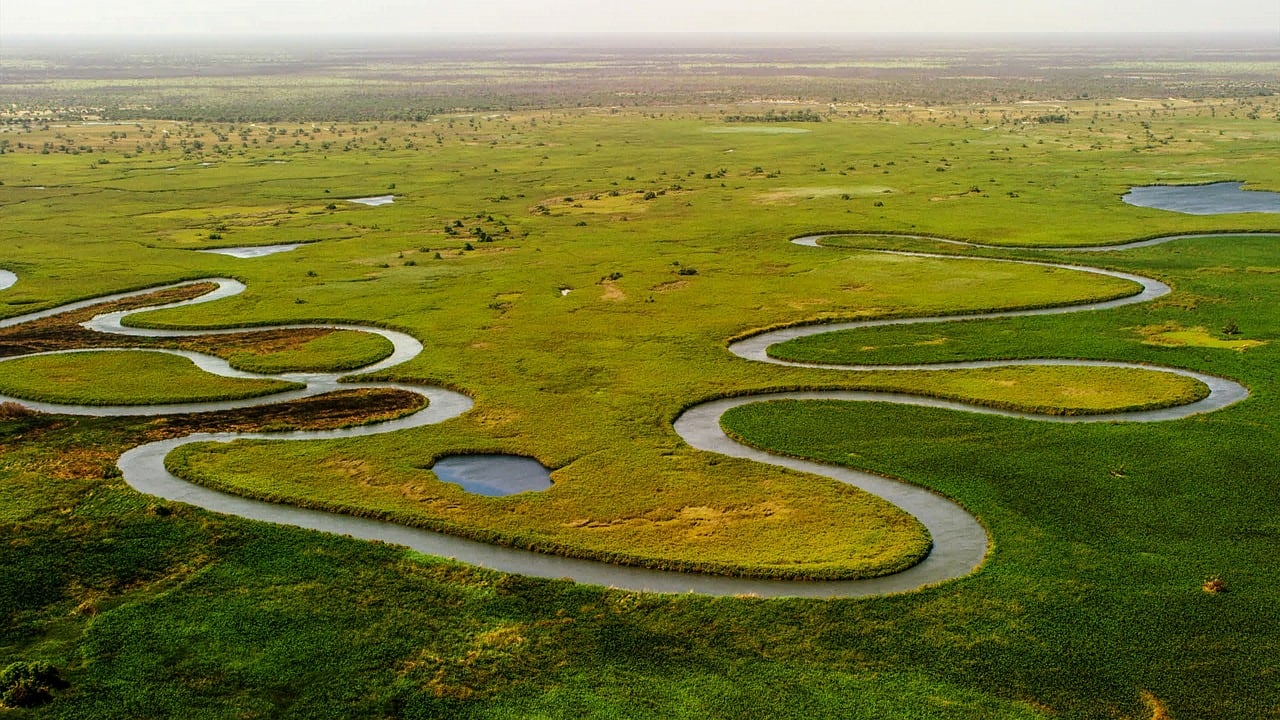Nestled within the vast expanse of the Kalahari Desert lies a jewel-toned oasis – the Okavango Delta. This UNESCO World Heritage Site is a unique ecosystem teeming with life, a stark contrast to the surrounding arid landscape. As the only major delta in the world that doesn’t empty into an ocean, the Okavango transforms the parched savanna into a lush wetland teeming with diverse flora and fauna.
The lifeblood of the delta is the mighty Okavango River, which begins its 1,600-kilometer journey in Angola’s highlands. For most of its course, the river flows through a sandy basin, slowly disappearing into the thirsty earth. Miraculously, when it reaches the outskirts of the Kalahari, the river takes a dramatic turn and spreads out in a fan-shaped delta, creating a 15,000 square kilometer labyrinth of waterways, lagoons, islands, and floodplains.
The reason behind this geographical anomaly lies in the unique geological features of the region. The Kalahari basin is a gently sloping depression, allowing the Okavango’s waters to spread out rather than rushing to a single point. Additionally, the presence of an impermeable layer of rock beneath the surface prevents the water from further seeping underground.
The arrival of the Okavango’s waters transforms the Kalahari. Lush grasslands spring to life, providing a haven for a spectacular array of wildlife. The permanent water sources attract an abundance of herbivores, including elephants, giraffes, zebras, and impala. These, in turn, form the backbone of the Okavango’s food chain, attracting a vast number of predators like lions, leopards, cheetahs, and wild dogs.
The Okavango Delta is also a haven for a diverse bird population. More than 400 species call this wetland home, including majestic cranes, vibrant kingfishers, and the iconic African fish eagle. The papyrus reeds lining the waterways provide nesting grounds for countless bird species, adding to the symphony of life that fills the air.
The Okavango Delta is not just a haven for wildlife, but also home to a rich human history. The indigenous people of the region, the BaYei, have lived in harmony with the Delta for centuries. They are skilled hunters and gatherers who have adapted their way of life to the rhythm of the seasons. Their presence serves as a reminder of the delicate balance between human activity and the natural world.
Today, the Okavango Delta faces several challenges. Climate change has led to decreased rainfall in the Angolan highlands, impacting the river’s flow. Additionally, upstream development projects pose a threat to the delicate water balance of the Delta. Conservation efforts are underway to ensure the long-term sustainability of this unique ecosystem.
The Okavango Delta is a testament to the power of nature. It is a place where life thrives in an unlikely setting, a vibrant oasis in the heart of the desert.







What do you think?
Show comments / Leave a comment